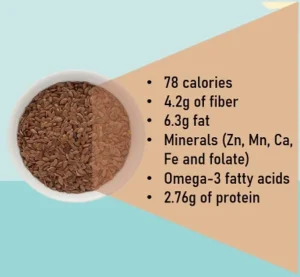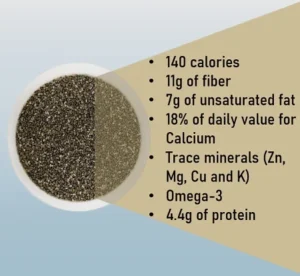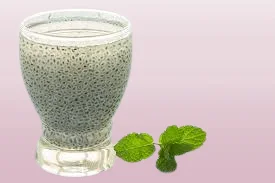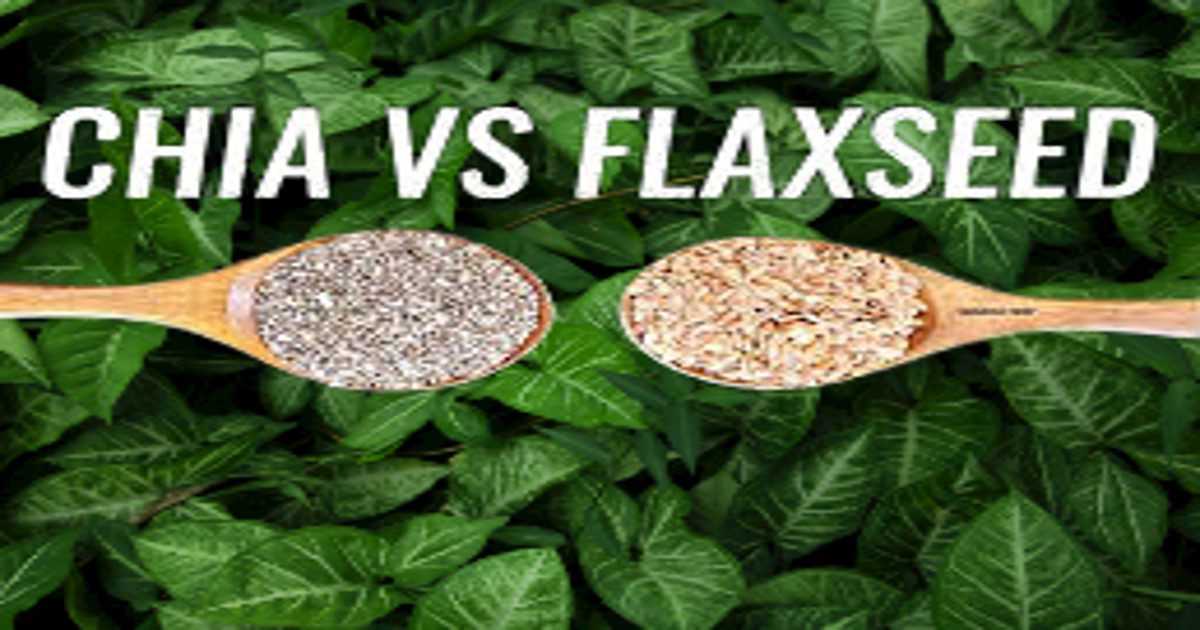Health Benefits of flax and chia seeds: The seeds of Chia and flax are nutritious seeds high in fiber, magnesium, and omega-3 fatty acids. Because of their potential health benefits, they are popular additions to smoothies, cereals, and salads. Their small size and mild taste make them easy to combine with other foods.
The seeds contain high levels of fiber that can improve digestion. They may also aid in stabilizing blood sugar levels and decreasing a person’s risk of heart disease. Chiaseeds and flaxseeds have comparable nutritional values. Research has indicated links to significant health benefits.
Health Benefits of flax and chia seeds
Both chia and flax seeds have high nutritional value. Chia seeds are higher in fiber while flax seeds contain more antioxidants. The nutritional values of chia and flax seeds are very similar as below.

Chia seeds are a nutritional powerhouse, containing fiber, protein, omega-3 fatty acids, calcium, and antioxidants. With their high fiber content, chia seeds can aid in digestion and regulate blood sugar levels. These tiny seeds are rich in omega-3 fatty acids, which possess anti-inflammatory properties that may help to lower the risk of heart disease, stroke, and other chronic conditions. Furthermore, chia seeds are an excellent source of calcium, magnesium, and phosphorus, essential minerals that support healthy bones. The numerous health benefits from chia seeds’ nutrition make them a great addition to your diet.
On the other hand, flax seeds are another nutrient-rich food that offers a variety of health benefits. They are an excellent source of fiber, omega-3 fatty acids, and lignans, which are plant compounds that have antioxidant and estrogen properties. Lignans may help reduce the risk of breast cancer in women, while the high fiber content of flax seeds can aid in digestion and promote regularity. The omega-3 fatty acids found in flax seeds can also help reduce inflammation, improve heart health, and lower blood pressure. All of these flax seed benefits make it an excellent inclusion to your daily food intake.
When considering flax and chia seed benefits, it’s important to note that while both chia and flax seeds have impressive nutritional profiles, they do have some differences. Chia seeds are higher in calcium and antioxidants, while flax seeds are higher in lignans. When it comes to fiber content, both seeds are comparable, with chia seeds being slightly higher in total fiber.
Flax Seeds
Flax, also known as common flax or linseed, is a flowering plant, Linum usitatissimum. It is cultivated as a food and fiber crop in regions of the world with temperate climates. Textiles made from flax are known in English as linen and are traditionally used for bed sheets, underclothes, and table linen. Its oil is known as linseed oil. The plant species is known only as a cultivated plant.

Cultivated flax plants grow to 1.2 m (3 ft 11 in) tall, with slender stems. The leaves are glaucous green, slender lanceolate, 20–40 mm long, and 3 mm broad. The flowers are 15–25 mm in diameter with five petals, which can be colored white, blue, yellow, and red depending on the species. The fruit is a round, dry capsule 5–9 mm in diameter, containing several glossy brown seeds shaped like an apple pip, 4–7 mm long.
Flax is grown for its seeds, which can be ground into a meal or turned into linseed oil, a product used as a nutritional supplement.
Flax seeds occur in two basic varieties/colors: brown or yellow (golden linseeds). Most types of these basic varieties have similar nutritional characteristics and equal numbers of short-chain omega-3 fatty acids. Yellow flax seeds, called solin, have a similar oil profile to brown flax seeds and both are very high in omega-3s. Flax seeds produce a vegetable oil known as flax seed oil or linseed oil, which is one of the oldest commercial oils. It is an edible oil obtained by expeller pressing and sometimes followed by solvent extraction. Solvent-processed flax seed oil has been used for many centuries as a drying oil in painting and varnishing.
Flax seeds are 7% water, 18% protein, 29% carbohydrates, and 42% fat (table). In 100 grams (3.5 oz) as a reference amount, flax seeds provide 534 kilocalories and contain high levels (20% or more of the Daily Value, DV) of protein, dietary fiber, several B vitamins, and dietary minerals. Flax seeds are especially rich in thiamine, magnesium, and phosphorus (DVs above 90%) (table).

As a percentage of total fat, flax seeds contain 54% omega-3 fatty acids, 18% omega-9 fatty acids (oleic acid), and 6% omega-6 fatty acids (linoleic acid); the seeds contain 9% saturated fat, including 5% as palmitic acid. Flax seed oil contains 53% 18:3 omega-3 fatty acids (mostly ALA) and 13% 18:2 omega-6 fatty acids.
A meta-analysis showed that consumption of more than 30 g of flax-seed daily for more than 12 weeks reduced body weight, body mass index (BMI), and waist circumference for persons with a BMI greater than 27. Another meta-analysis showed that consumption of flax seeds for more than 12 weeks produced small reductions in systolic blood pressure and diastolic blood pressure. A third showed that consuming flax seed or its derivatives may reduce total and LDL-cholesterol in the blood, with greater benefits in women and people with high cholesterol. A fourth showed a small reduction in c-reactive protein (a marker of inflammation) only in persons with a body mass index greater than 30.
Flax seed and its oil are generally recognized as safe for human consumption. Some of the benefits of the seeds of Flax are as below:
- These are loaded with important nutrients that help improve health
- The seeds have a high quantity of lignans, which may reduce the risk of cancer
- The seeds of Flax are rich in dietary fiber which help prevent constipation and improve digestive health
- Flax seeds help improve cholesterol levels due to its high fiber content
- These seeds have proven via studies that they help lower blood pressure
- The seeds of Flax contain high quality protein especially for people who do not eat meat.
- Flax seeds help maintain blood sugar level due to their insoluble fiber content.
- Other benefits of flaxseeds include: cholesterol, triglyceride, and blood sugar level control, inflammation reduction, constipation treatment, blood pressure reduction
How to use Flax Seeds?
Here are some ways in which you can prepare and consume the seeds of Flax:
Grounded seeds of Flax can be mixed into a smoothie or shake.
The seeds of Flax can be used for baking as well. You can add flax seed powder into your cookies, muffins, pancakes, and quick bread doughs.
You can use flaxseed oil in salads by drizzling some of it on roasted vegetables and you can even mix the oil with some herbs and spices and add them on to some crackers or chips.
If you are making your own granola bars you can add some grounded seeds of Flax to the mixture to give it a more nutritional boost.
Chia Seeds
Chia seeds are the edible seeds of Salvia hispanica, a flowering plant. The seeds are oval and gray with black and white spots, having a diameter around 2 millimetres (0.08 in). The seeds are hygroscopic, absorbing up to 12 times their weight in liquid when soaked and developing a mucilaginous coating that gives chia-based foods and beverages a distinctive gel texture. They are mottle-colored with brown, gray, black, and white.

The seeds are grown and consumed commercially in its native Mexico and Guatemala, as well as Bolivia, Argentina, Ecuador, Nicaragua, and Australia and United States.
Dried seeds of Chia contain 6% water, 42% carbohydrates (including a high content of dietary fiber), 16% protein, and 31% fat (table). In a 100-gram (3.5 oz) reference amount, chia seeds are a rich source (20% or more of the Daily Value, DV) of the B vitamins thiamin and niacin (54% and 59% DV, respectively) and a moderate source of riboflavin (14% DV) and folate (12% DV). The seeds are rich in several dietary minerals, including calcium, iron, magnesium, manganese, phosphorus, and zinc (all more than 20% DV; see table).
The fats of chia seed oil are mainly unsaturated, with linoleic acid (17%–26% of total fat) and α-linolenic acid (50%–57%) as the major fatty acids.
The seeds may be added to other foods as a topping or put into smoothies, breakfast cereals, energy bars, granola bars, yogurt, tortillas, and bread. Unlike flax seeds, whole chia seeds can but do not need to be ground to increase nutrient bioavailability because the seed coat is delicate and easily breaks apart when exposed to moisture. For this reason they are typically prepared with liquid foods. Some of the benefits of Chia seeds are as below:
- Give a quick nutritional boost, as it contain high amounts of mineral, vitamins and nutrients, with very few calories
- The seeds are rich in antioxidants which help fight the production of free radicals, which damage cell molecules and contribute to aging and diseases like cancer.
- The seeds of Chia are anti-inflammatory which means they help with chronic inflammation.
- The high fiber and quality protein in this seeds can help you lose weight.
- The seeds help maintain good blood sugar levels and improve insulin sensitivity.
- Consuming the seeds of Chia lowers the risk of heart diseases if accompanied with other healthy lifestyle practices like exercising.
- These are rich in important bone nutrients like calcium, magnesium, phosphorus and protein.
How to use Chia Seeds?
The seeds of Chia are a versatile ingredient and a delicious add-on for many of your everyday food and drinks. There are so many ways in which you can consume chia seeds. Some of these ways include:

You can sprinkle a few teaspoons of this seeds into your cereal, soup, stew or salads.
You can also use them as a topping for yogurt or oatmeal or include them in your baking batters like muffin or pancake batter and even in your bread dough
You can also stir them into your salad dressings, marinades, spreads and sauces
You can also prepare chia gel by mixing ¼ cup of chia seeds with 1 cup of water and adding it to your smoothies, puddings, and soups.
Side Effects
- Pregnant women should not eat ground flaxseeds as still there is no research regarding how flaxseeds affect pregnant women.
- The laxative property of flaxseeds leads to abdominal discomfort and bowel movement.
- You must intake flaxseeds with enough water; otherwise, they may obstruct the oesophagus and cause irritable bowel and abdominal pain.
- Overeating chiaseeds may cause digestive and gastrointestinal problems because they are high in proteins and fibers.
- You should ask your doctor before incorporating chiaseeds into your regular diet because the effect of chiaseeds on the blood sugar level is significant.
Other health related articles are also published by read4knowledge. CLICK here to read them.
